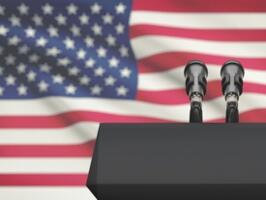Voters Are Less Critical of Media for Publishing Secrets
Voters are a lot less critical of news organizations that publish top secret government information.

Voters are a lot less critical of news organizations that publish top secret government information.

If there’s one thing voters across the partisan spectrum agree on, it’s that the media isn’t trying to help President Trump. That’s a big change from the Obama years.

Following numerous leaks of secret information intended to embarrass President Trump to the news media, most voters think the leakers should be punished.

President Trump last week appeared to back away from the longstanding U.S. policy position that a separate Palestinian state is essential to any peace settlement between the Israelis and Palestinians. But voters here tend to see that as key to any successful agreement.

Voters have long complained that President Obama was not sending illegal immigrants home fast enough. Now with President Trump in office, they’re worried that too many people are being deported.

Most voters think Russia is a likely influence on President Trump’s foreign policy but also tend to think critics of fallen National Security Adviser Michael Flynn are more interested in scoring political points than in U.S. national security.

President Trump has talked about a major federal plan to rebuild America’s infrastructure, and Democrats are receptive. Americans aren’t overly concerned about infrastructure problems, though, and see them primarily as a state responsibility.

President Trump's belief that radical Islamic terrorism is a threat to America is one of the primary reasons behind his temporary freeze on refugees and visas. Most voters continue to recognize that threat and believe the United States is still at war with radical Islam.

Most voters continue to believe that those who illegally overstay their visas to this country are a likely national security threat and that the federal government needs to work harder to send them home.

President Trump feels strongly that federal government overregulation is hurting the economy and has signed an executive order mandating that every time a government agency adds a regulation, it needs to cut two others. Most Republicans approve; most Democrats don't

While President Trump’s refugee freeze is tied up in the courts, the State Department has sped up acceptance of newcomers from the Middle Eastern terrorist havens targeted by the freeze. Most voters think that’s making America less safe.

Hillary Clinton recently declared that "the future is female," and nearly half of voters - regardless of gender - agree there will be more women leaders in the near future. But younger voters are more convinced of this than their elders.

President Trump has been highly critical of the judges who stopped his temporary refugee and visa ban. While just over half of voters agree with the president that most judges play politics, they still don’t think public criticism of judges by name is a good thing.

Money talks big time in U.S. politics, but three of the most influential behind-the-scene “talkers” - billionaires George Soros and brothers Charles and David Koch - are unknowns to a sizable number of voters.

Bernie Sanders has the edge, but it’s a close contest when Democrats are asked who should be the party’s nominee against President Trump if he seeks reelection in 2020. One-quarter of all voters, however, say the party should look for a new face.

President Trump is receiving lots of pushback from Democrats and many in the media over his foreign policy direction. Like most major issues, voters' partisan identification colors how they view this criticism.

Most voters still agree the federal government should only do the things Congress and the president agree on. But Democrats and Republicans have reversed their positions on executive actions by the president now that a Republican sits in the White House.

Voters now believe even more strongly that the United States is special among the nations of the world.

Most voters blame disagreements between President Trump and congressional Democrats on politics alone but don’t think the ongoing protests against the new president are going to make any difference.

More voters than ever consider the federal government a protector of individual liberty, although slightly more still view it as a threat. With a new Republican president in office, though, voters in the two major political parties have reversed their stances: GOP voters have more respect for the government, while Democrats are more wary.